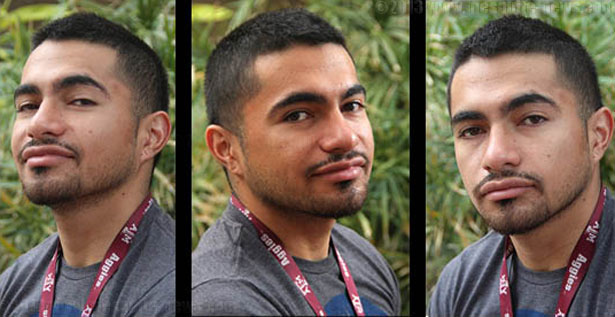
By Syed Tawseef Ali, Opinion Editor
syedt.ali@jaguar.tamu.edu
On Feb. 7, a current undergraduate, brought to the U.S. as a minor, received his work authorization through a U.S. presidential executive order.
Benjamin Rubio, psychology senior, was excited to receive his permit through his lawyer, since it provided him with protection from deportation, and an opportunity to work and pay taxes. Rubio immigrated to the U.S. in 2002, and says he plans on working at a state hospital.
“(This is) something, I have been waiting for over ten years,” Rubio said.
Struggling to have liberty in the only country he can call home is the highest priority for Rubio. He came to the U.S. at the age of 11 by crossing the Rio Grande from Nuevo Laredo, Mexico with his mother. He has lived in San Antonio since.
Since President Obama’s executive order generalized Deferred Action for Childhood Arrivals (DACA) last year, thousands of undocumented students obtained work permits and temporary protection from deportation nationwide. Rubio himself was approved for deferred action in February which allowed him to obtain work authorization and other mandatory documents. However, the legislation does not provide applicants with a legal status as an immigrant.
Janet Napolitano, secretary of the Department of Homeland Security followed up last year by announcing that eligible DREAM Act immigrants who pose no threat to national or public safety were to be granted relief of their removal from the country. As of January, over 154,000 DACA applicants have been approved, and Texas yields the second highest number of applicants in the nation, according to the U.S. Citizenship and Immigration Services data.
SUDA’s impact
Rubio’s work permit approval is the latest chapter in a long and powerful story. When Rubio enrolled at Texas A&M University-San Antonio in 2011, among his top priorities was to establish a chapter of the Students United for the Dream Act (SUDA), and he did so from scratch. The Development, Relief and Education for Alien Minors (DREAM) Act is a heavily debated legislative law, which grants undocumented immigrants who came to the U.S. as minors, a path to citizenship. There are different levels at which the law can be implemented. Conclusively, it is just another chapter in immigration reform.
Today, Rubio is the founding and current president of the SUDA chapter at this university. Because of him, this campus understands what undocumented students, or ‘dreamers’ are fighting for. And, anyone who has had the opportunity to listen to him at length, will learn a great deal about this nation’s broken immigration system.
On a larger scale, Rubio’s story matters because he is one of thousands of students across the country who are watching closely as senators debate a nationwide immigration plan. In February, a democratic draft for immigration reform was made public, as a contingency plan. It addressed the 11 million undocumented immigrants, stronger border control, and heavier use of e-verify, an employment monitor for the federal government. After all the criticism from the Republican Party, I asked Rubio for his view on the matter. Rubio wasn’t completely satisfied.
“These are things that happen every time,” Rubio said.
It now seems like a repeating pattern, he said. First there is the unveiling of a proposal in Washington, followed by a long wait to see what it means. And second, students like Rubio must wait to see if the reforms pass. Rubio and other SUDA members feel that our immigration system is broken and they hope to educate others to fix it, not just for themselves, but for the benefit of the nation. The organization currently has six active members and their objectives are to put pressure on legislators and to help the lives of those affected by a broken immigration system.
Formation of a movement
Forming SUDA from the ground up was an attractive reason for Rubio to apply to Texas A&M-San Antonio. Apart from the affordable tuition, the university did not have an immigrant movement present. He vowed to start a movement, to form a network and to bond with new members.
His ambition to start a new SUDA chapter on this campus began by seeking a faculty advisor. He approached Samuel Rock, visiting assistant professor of psychology who agreed to be the organization’s first faculty adviser. Rock was followed by sociology professor Rosario Torres-Raines. Concurrently, SUDA receives advising from Mariano Aguilar, english faculty from San Antonio College (SAC) who has advised Rubio since he was a community college student.
SUDA believes in generalizing information to the public, defending the rights of immigrants and supporting those who are affected by the broken immigration system. These principles are important enough to Rubio and SUDA, that they worked together with the Campus Activities Board to make sure their organization’s constitution was placed in a time capsule in November 2011 and buried on the grounds at Main Campus Building.
Support from the Alamo Colleges gave Rubio and others the leadership experience they needed to start a chapter here on this campus. But it hasn’t been easy. He says membership is harder to form on a commuter campus.
During Rubio’s time spent at SAC, he was among the founding members of the San Antonio Immigrant Youth Movement (SAIYM), a sister organization of SUDA. Much of the work done there was identical. The difference in the two organizations comes from differences in the student body. SAC has an urban setting with a large student body; this campus, currently, has a smaller commuter population. Rubio and his team represented SAC’s support for the DREAM Act at the federal and state capitols. They held several successful DACA clinics, and raised awareness exponentially.
With support of non-governmental organizations such as Latino Legal Voice for Civil Rights in America (MALDEF), Texas Association of Chicanos in Higher Education (TACHE), League of United Latin American Citizens (LULAC), America’s Voice, United We Dream (UWD), Cesar Chavez Legacy and the La Prensa Foundation, SAIYM managed to have its voice heard as far as the U.S Senate.
Continuing education
SUDA is attempting to host a DACA clinic on March 30 at the Viva Abundante Church. DACA clinics are the most effective way to educate and help dreamers on campus. A large portion of undocumented high school students are unaware they are eligible for higher education, nor are they aware that their education costs may be covered by the state. At these clinics, it is possible for these students to experience life-changing moments.
“We like to believe we are making a difference,” said Benjamin, in regards to the impact SUDA can have in society.
Immigration reform, a major priority
A month before he graduated from Edison High School, Rubio found out he was eligible for state funding for higher education. Rubio was not aware of Rick Perry’s signing of Texas’ DREAM Act in 2001 until he was about to enroll in college. Today, he is looking to the future as a near-college graduate, looking for meaningful work, and continuing his important work as president of an active student organization with a cause. Like Rubio, undocumented students work, learn and evolve beside us. They represent the skills and intellect that we need collectively. In order to be a progress-driven civilization, we need to eliminate laws that create double standards among Americans.
Immigration policy is important to the future of the U.S., just as it has been an important part of its history. No good will come from dividing the physical population of America. As for natural migration, no governing body can prevent it peacefully. It is best to have a transparent way to control it.
About the Author:
Syed Tawseef Ali is an international student from Bangladesh.
Author’s Note: Secretary of SUDA, Alina Cortes, pointed out during the three interviews I conducted for this editorial that international students and dreamers often oppose one another on immigration reform because international students enter the country legally, while dreamers do not. When politics are put aside, we are all immigrant students who are here to benefit from the quality of education, a better life and most of all, freedom. Cortes talks about how fortunate she is to be in a country where she can say what she wants, and voice her support for causes she believes in. In the process of writing this editorial, I gained courage from listening to Rubio and the Cortes sisters, all of whom are members of SUDA.






